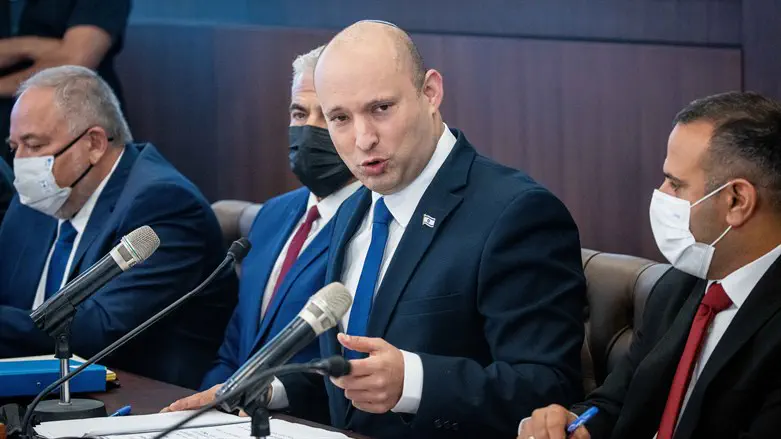
At the start of the weekly cabinet meeting on Sunday, Prime Minister Naftali Bennett rejected the notion that he would allow the King of Jordan to dictate Israeli policy on the Temple Mount.
Bennett added that he would not bow to the demands of Jordan or Ra'am party head MK Mansour Abbas, to alter the rules for Jewish visits to the Mount, nor would he permit Waqf officials enhance their presence on the Mount plaza.
"I want to make it clear that there is not, and there will not be, any political calculations made with regard to our war on terrorism," Bennett said. "And it goes without saying that all our decisions with regard to the Temple Mount and Jerusalem will be taken by the Israeli government, which is sovereign over the city, without any consideration for outside interests. We absolutely reject any foreign intervention in the decisions made by the Israeli government."
The Prime Minister stressed that, "The State of Israel will continue to maintain respectful relations between the members of all religions in Jerusalem, as we have done in the past. Our capital is a united Jerusalem, which is the capital of just one country - Israel."
In a comment addressed to his coalition partners, Bennett added, "Anyone who has any sense of national responsibility will do whatever he can to ensure that this good government endures, and I expect and know that all parties and all heads of parties will do what they can and indeed are already doing so."
However, earlier on Sunday morning, MK Maazen Ghenaim (Ra'am) made a statement indicating that the coalition's future was certainly imperiled. What Ghenaim threatened specifically was that when a no-confidence motion was brought before the Knesset, his party would absent itself from the Knesset, opening the possibility for the opposition parties to win the vote and topple the government.
Speaking on Radio A-Shams, Ghenaim said, "The way the government, and specifically Yamina, is behaving is forcing us out of the coalition. I am advising Ra'am that we leave the coalition in the coming session.
"There is no doubt that we are at a critical time here," Ghenaim said. "This is our position: We should leave the coalition and head to elections, and I believe that we should be coordinating our moves with the Joint List on this matter," he stressed, referring to the Arab party that currently sits in the opposition.
A vote for the dispersal of the Knesset is due to be brought before the plenum this week, and Ghenaim said that his party has yet to determine its conduct for this specific vote, although he personally intends to sit it out at home, awaiting an update on negotiations between his party and the rest of the coalition.
This week, the summer session of the Knesset opens, with most analysts assessing its chances of lasting out its term as low. Haaretz' political analyst, Yossi Verter, has said that he is 80 percent certain that the government will only last another month, give or take, explaining that the government's "vital organs" are still in critical condition.
"The structure of the coalition is not stabilizing," he said. "Ra'am is still wavering, and every little wobble on the security-policy front - such as Jerusalem Day which is coming up soon, unrest in Gaza, or the Temple Mount - could tip the scale."
According to Verter, every day Bennett has to check that Yamina MK Abir Kara is still on-board. "The doubts and uncertainties now include Nir Orbach, who is under more and more pressure as time goes on. Shaked suggests allowing him to present his own 'policy achievements' which should keep him in line. With regard to Shaked herself, the third member of this triumvirate, Bennett is more certain. They've had a number of disagreements along the way, but he's not worried that she'll follow in Silman's footsteps and drag the other two [Orbach and Kara] after her.
"Shaked also keeps Bennett updated on what's going on with Kara and Orbach," Verter added. "From the outside, it's not entirely clear whether Shaked is the one representing the troika in the Prime Minister's Office, or whether she is the one promoting Bennett's position before them. What we do know is that all three meet every week, ever since Silman defected.
"On Memorial Day, the three met at Orbach's home in Petah Tikva, which was problematic given the timing," Verter noted, explaining that, "politicians usually avoid doing anything to attract attention on such days, and if they do have to attract attention, they do what they can to defuse it."

